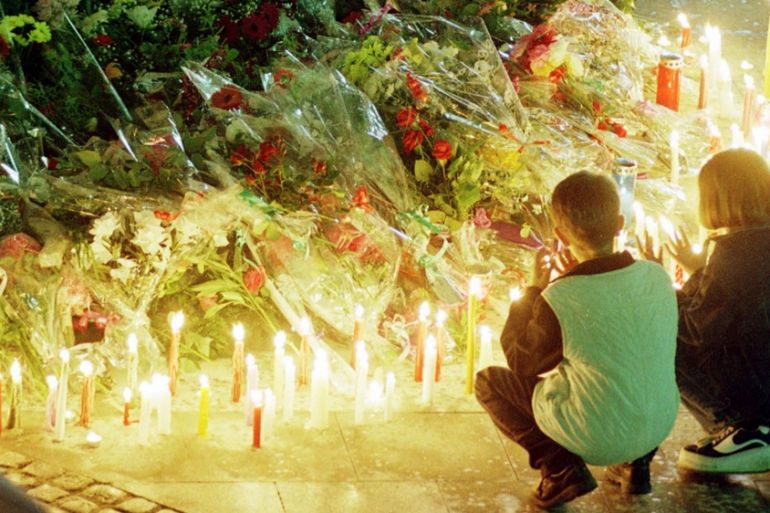Serbia’s defence ministry slammed for promoting revisionism
Book titled, Tuzla Gate: a staged tragedy, condemned as an attempt to deny war crimes by Serb forces in Bosnia.

Serbia’s defence ministry has been sharply rebuked by human rights activists for promoting books that deny war crimes committed by Serb forces in former Yugoslavia.
This week the ministry promoted a new book titled, Tuzla Gate: a staged tragedy, that denies the fact that on May 25, 1995, Bosnian Serb forces fired an artillery round that hit an area of Tuzla’s city centre known as the “Gate”, killing 71 civilians – mostly young people averaging 23 years of age.
Another 240 people were wounded.
The book, written by Ilija Brankovic, a former general of the Serb-dominated Yugoslav People’s Army, was promoted on Tuesday at the Central Military Club in Belgrade, owned by Media Centar Odbrana, the publishing and press centre of Serbia’s defence ministry, according to Balkan Insight news website.
On Wednesday, the Council of Europe Commissioner for Human Rights Dunja Mijatovic criticised the ministry, calling the book’s promotion “an attempt to deny” war crimes already established as such by the International Criminal Tribunal for former Yugoslavia (ICTY) and in national war crimes tribunals.
“Propagating falsehoods and disinformation in a post-war context is dangerous exercise, one that seriously undermines all efforts towards durable peace and reconciliation,” Mijatovic wrote on Facebook.
“Instead of providing a public platform to propagate views that deny war crimes, political leaders and government representatives in Serbia must step up their work on fighting impunity for war-related crimes, provide civilian war victims with effective reparations, and support reconciliation efforts in the region.”
Brankovic, the author of the book, wrote the Gate area of Tuzla was not shelled, rather it was destroyed by an explosive device pre-planted by others.
According to Balkan Insight, the book’s aim is to prove that Novak Djukic – wartime commander of the Bosnian Serb Army’s Tactical Group who was convicted of the attack – wasn’t responsible for ordering Tuzla to be shelled.
In 2014, Bosnia‘s state court sentenced Djukic to 20 years in prison for orchestrating the attack against civilians.
However, a few days later Djukic’s defence lawyer informed the court he travelled to Serbia for medical treatment where he remains.
Bosnia issued an arrest warrant but Serbia does not share an extradition treaty with its neighbour.
War criminals turned authors
Local human rights groups condemned the book, with the Belgrade-based Humanitarian Law Centre issuing a statement on Thursday saying “the continued denial of crimes at the Gate is not surprising, but merely confirms the fact that Serbia is a safe-house for fugitives of justice such as Novak Djukic.”
Serbia’s ministry of defence responded to Mijatovic, criticising her for not “searching for the truth”.
“Any attempt at a different view of the civil war in Bosnia and Herzegovina is a big crime if it comes from Serbs,” the ministry said in a statement published on its website.
The ICTY however has previously established that the war in Bosnia was not a civil war, rather an “international armed conflict”.
The ministry added: “Many times Serbs have been and still are victims of double standards and [are often] tried for crimes of others. Serbia will not ban books. This is a tradition of some other nations.”
Marko Attila Hoare, a historian and associate professor at the Sarajevo School of Science and Technology, told Al Jazeera war crimes denial and victim-blaming have been endemic among the Serbian political class, media, and public opinion since the start of the war in the early 1990s.
“It is the only way that nationalist Serbs have been able to rationalise and explain away the reality of atrocities by their side,” Hoare said.
“That this continues to be promoted in such a high-profile way is evidence of how little has changed over the past quarter-century or so. It demonstrates how far Serbia is from a proper reckoning with the dark aspects of its recent past.”
Promoting war testimonies
|
|
Books authored by convicted Serb war criminals have become common in the country.
In October, the Serbian defence ministry also organised an event at the Belgrade Book Fair to promote a book by former Yugoslav army officer Nebojsa Pavkovic, who is currently serving time in prison for war crimes in Kosovo.
Last year, the ministry was also sharply criticised for publishing and promoting war testimonies by Pavkovic and former Serbian general Vladimir Lazarevic, also convicted of war crimes by The Hague-based UN court.
According to journalist Hasan Rahmani, there have been at least 119 books published so far, written by 22 former generals and politicians who have been convicted of war crimes, including genocide.
Emir Suljagic, professor of international relations at the International University of Sarajevo and Bosnia’s former deputy minister of defence, told Al Jazeera there has never been any discontinuity between the government of former Serbian President Slobodan Milosevic and post-Milosevic governments in Serbia in regards to Serbia’s genocide in Bosnia.
“Milosevic was in fact ousted for not getting the job done,” Suljagic said.
“There are only two differences between Milosevic and the [Serbian President Aleksandar] Vucic regime – the amount of armaments available and international context.
“If one or both change in the foreseeable future, Serbia will be aiming at Bosnia and Herzegovina again, with an eye towards completing the job Milosevic failed to do.”